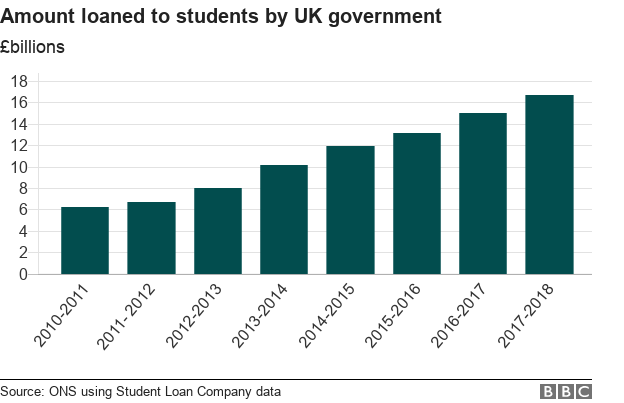
What is the impact of student loans on your debt after you graduate?
Labour MP Zarah Sultana has spoken about the impact of “colossal” student loan debt in Parliament.
Holding up her loan statement, she pointed out that her debt of £50,000 built up £2,000 of interest last year.
The 26-year-old also compared working-class graduates in debt to Prime Minister Boris Johnson, who she says “went from the playing fields of Eton to a free education at Oxford”.
Universities Minister, Chris Skidmore, responded, saying that support for the lowest income students was at “record levels”.
But is student debt as bad as it sounds?
Radio 1 Newsbeat’s teamed up with BBC Reality Check to look into how much of an impact student loans have on life after university.
How does student debt work?
 Image copyrightGETTY IMAGES
Image copyrightGETTY IMAGESHere are the basics.
Most people who go to uni take out a loan in two parts – for tuition fees (the amount you pay the uni) and a maintenance loan (for living costs).
(Scroll down to see how much tuition fees are in different parts of the UK.)
The amount you get for the maintenance loan depends on your household income.
For example, if you did a three-year course at £9,250 a year and got £6,378 a year for a maintenance loan, you’d graduate with £46,884 of debt.
That’s before you add interest. It sounds like a massive amount – because it is.
It’s unlikely you’ll ever pay it all back (more on that later) – but just having that amount of debt hanging over your head could be pretty disheartening.
But student debt doesn’t work like other loans.
So how’s it different to a bank loan?
 Image copyrightGETTY IMAGES
Image copyrightGETTY IMAGESThere are some big differences between a student loan from the government and anyone else:
- All debt is wiped after 30 years
- How much you pay back depends on how much you earn
- It doesn’t impact your credit score
- Your house or belongings won’t get repossessed if you don’t keep up repayments
It might be easier to think of it a bit like a tax.
Repayments come straight out of your pay and the amount you pay depends on your income.
At the moment, graduates don’t start repaying their loans until they earn over £25,725 a year (that threshold’s going up to £26,575 in April 2020).
Over that amount, you pay back 9% of your income.
Graduates who earn £30,000 a year would pay back about £385 a year (just over £32 a month).
So, an MP like Zarah Sultana who earns a basic salary of £79,468 will start paying about £4,837 back per year.
But remember, we also need to take interest into account.
How does interest work on a student loan?
 Image copyrightGETTY IMAGES
Image copyrightGETTY IMAGESAlmost every loan you ever take out will have interest – that’s the fee for borrowing the money.
Zarah Sultana says hers was about £2,000 last year.
For student loans, the amount of interest you pay is related to two things. The interest rate is based on the Retail Price Index – which measures changes to the cost of living in the UK – currently 2.4% – and your own earnings.
While you’re studying you are still charged interest of RPI + 3% a year – so at the moment it’s 5.4% per year – the maximum.
After you graduate, you pay somewhere between 2.4% and 5.4% – depending on how much you earn.

In Parliament on Monday, Labour MP Zarah Sultana challenged the government on the cost of university for working-class students.
Universities Minister Chris Skidmore responded: “The number of people from disadvantaged backgrounds going to university has risen by 62% since 2009.”
The Department for Education confirmed to Reality Check that the minister was referring to the proportion of young people, rather than the number.
That figure comes from Ucas, which organises the application process for universities.
Their statistics break down the proportion of young people going to university who live in areas that historically send small numbers of students to higher education.
The proportion of UK students going to university by the age of 19 from the 20% of areas that sent the lowest numbers to university rose from 13% in 2010 to 21% in 2019 – that’s a 62% increase in the rate.
Not all of those students will come from disadvantaged or working-class backgrounds – not everybody in a poor area is disadvantaged – but it is a pretty good measure.
An alternative is to look at students who qualified for free school meals (FSM) who go to university. That figure for England has gone up from 18.6% in 2009-10 to 26.3% in 2018-19, which is a 41% increase.
- Reality Check: Would cutting tuition fees help poorer graduates?

How much do student loans cost the rest of the UK?

One of the main reasons tuition fees went up in 2012 was because the government wanted to reduce the amount it paid out.
The idea was for students to pay for their own tuition, rather than taxpayers.
But as the graph above shows, the opposite has happened – the amount the government’s giving out in loans has gone up.
The reality is that most graduates won’t pay back what they borrow.
Social mobility charity The Sutton Trust estimates that 81% of students will not pay off their loans in full.
The government’s own Office for Budget Responsibility estimates only 38% of total money and interest will be repaid.

How much are tuition fees?
Education is a devolved issue, which means tuition fees vary depending on where in the UK you study – and where you come from.
For English people, unis can charge up to £9,250 a year anywhere in the UK, except in Wales where the amount is £9,000.
Scottish people don’t have to pay to study in Scotland but they do have to pay up to £9,250 in England and Northern Ireland and £9,000 in Wales.
Welsh people can be charged £9,000 a year in Wales and £9,250 everywhere else.
And Northern Irish people are charged up to £4,275 in Northern Ireland, £9,000 in Wales and £9,250 in England and Scotland.
[“source=bbc”]





